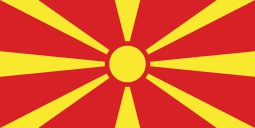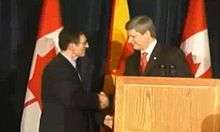Macedonian Canadians
Macedonian Canadians (Macedonian: Македонски Канаѓани) are Canadian citizens of ethnic Macedonian descent or Macedonian-born people who reside in Canada. According to the 2016 Census there were 43,110 Canadians who claimed full or partial Macedonian ancestry.
Македонци во Канада | |
|---|---|
| Total population | |
| 43,110 by ancestry, 2016 Census | |
| Regions with significant populations | |
| Toronto, Ottawa, Montreal, Vancouver | |
| Languages | |
| Macedonian, Canadian English | |
| Religion | |
| Eastern Orthodox Church | |
| Related ethnic groups | |
| Macedonian Americans, Bulgarian Canadians,[1] Yugoslav Canadians |
| Part of a series on |
| Macedonians |
|---|
 |
| By region or country |
| Macedonia (region) |
| Diaspora |
|
|
|
|
|
Subgroups and related groups |
|
|
| Culture |
| Religion |
| Other topics |
History
Many Macedonians emigrated to Canada as "pečalbari" (seasonal workers) in the mid 19th and early 20th century.[2] Thousands of Macedonians emigrated to Canada after the failure of the Ilinden Uprising.[2]
The first Macedonian organizations were the Zhelevo Benevolence Brotherhood and the Oschima Benefit Society St. Nicholas, both established in 1907 in Toronto by emigrants from Zhelevo (Antartiko) and Oschnima (Trigonon) in Aegean Macedonia.[3][4] Other Macedonian organizations were soon established by emigrants from Zagorichani (Vassiliada), Oshtima (Trigonon), Smardesh (Krystallopigi), Gabresh (Gavros), Banitsa (Vevi), Buf (Akritas) and Tarsie (Trivuno), all villages in Aegean Macedonia.[4][2]
An internal census counted 1910 Macedonians in Toronto, who were principally from Florina (Lerin) and Kastoria (Kostur) then in Ottoman empire.[2]
In 1910 they established Sts. Cyril and Methody Macedono-Bulgarian Orthodox Church in Toronto,[2] and that church published The First Bulgarian-English Pocket Dictionary in 1913.[5]
By 1940 there were claims that over 1200 Macedonian families were in Canada. Post-World War II and Greek Civil War migration cause the numbers of Macedonians in Canada to swell.
Many early Macedonian immigrants found industrial work in Toronto, either as factory hands or labourers in abattoirs, or in iron and steel foundries. Many ended up running and owning restaurants, butchers and groceries. Macedonian entrepreneurs and their descendants eventually employed their numerical strength within the food service industry as a catapult into a variety of larger and more sophisticated ventures.[6]
Today, most Macedonian Canadians have moved out of cities and into the suburbs, and are employed in the professional, clerical, and service sector of the economy.
The 2001 census recorded 31,265 Macedonians,[6] while the 2006 census recorded 37,705 people of Macedonian ancestry. However, community spokespersons claim they number over 100,000. The Institute for Macedonians Abroad claims that there are 120,000 Macedonians in Canada.[7] The Macedonian government estimates that there are 150,000 Macedonians in Canada.
In the first half of the 20th century, most of the Macedonians were largely classified as Bulgarians or Macedono-Bulgarians.[8][9][10] At that time the political organization by the Slavic immigrants from the region of Macedonia, the Macedonian Patriotic Organization, also promoted the idea of Macedonian Slavs being Bulgarians.[11]
Aegean Macedonians
Many thousands of Aegean Macedonians emigrated to Canada in the 1890s. They settled primarily in Ontario, especially Toronto. Many early Aegean Macedonian immigrants found industrial work in Toronto. Later migrants found work as factory in abattoirs and foundries. Chatham and Windsor attracted many Macedonian immigrants who worked along the railroads. Many later settled in Detroit, Michigan.
Many Aegean Macedonians are parishioners of the Macedonian Orthodox Church.
They set up many organizations, such as the Lerin Region Macedonian Cultural Association of Canada. In 1979 The Association of Refugee Children from Aegean Macedonia (ARCAM) was set up in order to unite the former child refugees from all over the world. It was reported that chapters had been set up in Toronto, Melbourne, Perth, the Republic of Macedonia, Slovakia, Czech Republic and Poland.[12]
Settlement patterns

Many Macedonians originally settled in industrial areas. Most Macedonians came to Canada via the process of chain migration.
Organizations
Many organizations have been set up by the Macedonians in Canada. Village associations from Banitsa, Osčima, Bouf and Želevo have been set up. A Macedonian Boys' club was founded in Toronto in 1915. Community picnics were also very common amongst Macedonian immigrants. Macedonian basketball and hockey teams were founded. Fundraisers for assistance for the Greek Civil War and the 1963 Skopje earthquake were held. Other establishments, such as the Canadian Macedonian Restaurant Co-op (1970), Canadian Macedonian Business and Professional Association, Canadian Macedonian Historical Society and Macedonian Canadian Medical Society (1992) have been founded in recent years, along with the Macedonian Film Festival (2006). Youth organizations such as Macedonian Association of Canadian Youth, Ryerson Association of Macedonian Students and the Association of Macedonian Students at the University of Toronto are also in operation.
Religion
Originally Macedonian churches were established under the Bulgarian Diocese of America, Canada and Australia. The church Saint's Cyril and Methodius was consecrated in Toronto in 1910. This was followed by the St. George Macedono-Bulgarian Orthodox Church and the Holy Trinity Macedono-Bulgarian Church. Post-war immigrants built churches under the jurisdiction of the Macedonian Orthodox Church. They were St Clement of Ohrid, St Demetrius of Salonica, St Ilija, St Nedela and St Naum of Ohrid. There are two Macedonian cathedrals in Canada – Toronto being the location of the largest Macedonian church community in Canada: St Clement of Ohrid in Toronto.[14]
Notable Macedonian Canadians
Academia
- Chris Paliare – lawyer, named one of the 50 most influential in Toronto[15]
- Andrew Rossos – historian
- Boris P. Stoicheff – physicist
Arts
Business
- John Bitove – Chairman and CEO of Obelysk, the Mobilicity, Scott's Real Estate Investment Trust, and SiriusXM Canada
- John Bitove, Sr. – businessman and philanthropist
- Lou Naumovski – Vice President, Commercial and General Director, Russia, for Kinross Gold Corporation
- Susan Niczowski – CEO and founder of Summer Fresh Salads Inc.[20]
- Steve Stavro – businessman and philanthropist; founder of Knob Hill Farms, owner of Toronto Maple Leafs, director of Liquor Control Board of Ontario
- Nada Laskovski – entrepreneur, co-founder of UrbanToronto and Chart Attack
- Lorne Bozinoff - founder and CEO of Forum Research
Music
- Donna Grantis – composer and guitarist[21]
- Justin Peroff – drummer for Broken Social Scene
- Dan Talevski – singer-songwriter
Politics
- Paul Christie – Toronto City and Metropolitan Councillor, TTC Chair
- Lui Temelkovski – Liberal MP, Oak Ridges, Markham 2004–2008
Sports
- Tommy Ivan – NHL coach, winner of four Stanley Cups
- Dan Jancevski – NHL defenseman
- Ed Jovanovski – NHL player
- Steve Staios – NHL player
- Steven Stamkos – NHL player
- Alek Stojanov – NHL player
- Christopher Tanev – NHL player
- Brandon Tanev – NHL player
- Michael Zigomanis – NHL player
Television and entertainment
- Nicole Servinis – reporter on Breakfast Television (Toronto) and producer for Entertainment Tonight Canada
- Ziya Tong – television producer
- Stephanie Skenderis – television producer and reporter for CBC News
- Natasha Negovanlis – actress, singer, writer
Other
- Angel Shopoff - Civil engineer in charge of the construction of the Burlington Skyway
See also
References
- Macedonian immigrants have also been subsumed under the heading of Bulgarian immigrants, especially as regards the first wave, because in that period the history and population of the two countries was not as distinct as it is today. Until World War II, most people who today identify themselves as Macedonian Canadians claimed a Bulgarian ethnic identity and were recorded as part of the Bulgarian ethnic group (Magocsi, p. 287). Hence the Bulgarian community in Canada is deeply linked to the Macedonian Canadians. The Bulgarian Diaspora in Canada: Stories of Immigration, Glavanakova, Alexandra; Andreev, Andrey, 2010, CEACS, Brno, Czech Republic; Migrating Memories: Central Europe in Canada, Volume 2 – Oral Histories. (ed.) Rodica Albu, 2010; ISBN 978-86-7746-255-0.
- Lillian Petroff (December 15, 2013). "Macedonian Canadians". The Canadian Encyclopedia. Retrieved August 24, 2019.
- Petroff, Lillian (January 1995). Sojourners and settlers: the ... – Google Books. ISBN 9780802072405. Retrieved 2011-05-11 – via Google Books.
- Petroff, Lillian (January 1995). Sojourners and settlers: the ... – Google Books. ISBN 9780802072405. Retrieved 2011-05-11 – via Google Books.
- Petroff, Lillian (Winter 1981). "An Everyday Book: The First Bulgarian-English Pocket Dictionary". Polyphony. 3 (1): 20. Retrieved 12 August 2013.
- "Macedonian History – Canadian Macedonian Historical Society". Macedonianhistory.ca. 2008-05-19. Retrieved 2011-05-11.
- Nasevski, Boško; Angelova, Dora. Gerovska, Dragica (1995). Македонски Иселенички Алманах '95. Skopje: Матица на Иселениците на Македонија, 48,49
- South Slavic immigration in America, Twayne Publishers. A division of G. K. Hall & Co., Boston, George Prpic, John Carroll University, 1976, Chapter 18, The Bulgarians and Macedonians. p. 212 ..."The smallest of the South Slavic ethnic groups in America are the Bulgarians. One branch of them are the Macedonians."...
- Magocsi, Paul R. (1999). Encyclopedia of Canada's peoples – Paul R. Magocsi, Multicultural History, pp. 287–292, University of Toronto Press, 1999, ISBN 0-8020-2938-8. ISBN 9780802029386. Retrieved 2011-05-11 – via Google Books.
- Danforth, Loring M. (1997-04-06). The Macedonian Conflict: Ethnic Nationalism in a Transnational World, Page 88, by Loring M. Danforth. ISBN 0691043566. Retrieved 2011-05-11 – via Google Books.
- Danforth, Loring M. (1997-04-06). The Macedonian Conflict: Ethnic Nationalism in a Transnational World, Page 87 by Loring M. Danforth. ISBN 0691043566. Retrieved 2011-05-11 – via Google Books.
- Human Rights Violations Against Ethnic Macedonians-Report 1996, Macedonian Human Rights Movement of Canada, Toronto, 1996; p.111-112
- TJ-Hosting (2009-02-15). "Macedonian Human Rights Movement International". MHRMI. Retrieved 2011-05-11.
- Aco Lukaroski. "St. Clement of Ohrid Cathedral". Stclementofohrid.com. Retrieved 2011-05-11.
- "Македонец во Канада меѓу 50-те највлијателни луѓе во Торонто – Net Press".
- Close, Michael (1996). Workers. München: Zauberzentrale München. ISBN 978-3-929142-02-0.
- "The Beat Generation, Words and Music, John Evans Productions". www.johnevansproductions.com.
- (Computing), info@macedonianlife.com (Goran Bacvarovski – MaxxSoft. "Macedonian Life – Paid Advertisement". www.macedonianlife.com.
- Computing), info@macedonianlife.com (Goran Bacvarovski – MaxxSoft. "Macedonian Life – Virginia Evans". www.macedonianlife.com.
- "Summer Fresh". Summer Fresh.
- "Interview mit Donna Grantis" (PDF). Archived from the original (PDF) on 2011-08-29. Retrieved 2012-09-16.
External links
- Macedonian Community of Toronto Blog
- Macedonia Canadian Newspaper
- Headquarters of the Macedonian Community in Canada
- United Macedonians of Canada
- Macedonian Human Rights Movement
- Canadian Macedonian Historical Society
- United Macedonian Diaspora
- Macedonian Embassy in Canada
- St Clement of Ohrid, Toronto
- Macedonian Centre for Culture and Social Integration
.svg.png)